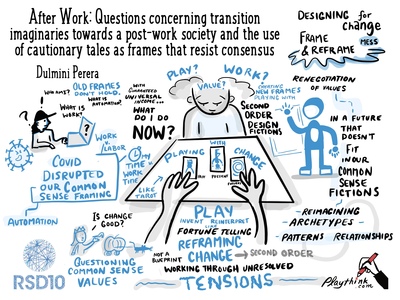After Work: Questions concerning transition imaginaries towards a post-work society and the use of cautionary tales as frames that resist consensus
Perera, Dulmini (2021) After Work: Questions concerning transition imaginaries towards a post-work society and the use of cautionary tales as frames that resist consensus. In: Proceedings of Relating Systems Thinking and Design (RSD10) 2021 Symposium, 2-6 Nov 2021, Delft, The Netherlands.
Preview |
Text
Perera_After_slides_2021.pdf Available under License Creative Commons Attribution Non-commercial No Derivatives. Download (3MB) | Preview |
Preview |
Text
Perera_After_paper_2021.pdf Available under License Creative Commons Attribution Non-commercial No Derivatives. Download (1MB) | Preview |
![Perera_After_gigamap_2021.jpg [thumbnail of Perera_After_gigamap_2021.jpg]](https://openresearch.ocadu.ca/3835/3.hassmallThumbnailVersion/Perera_After_gigamap_2021.jpg)  Preview |
Image
Perera_After_gigamap_2021.jpg Available under License Creative Commons Attribution Non-commercial No Derivatives. Download (1MB) | Preview |
Abstract
The consensus among various stakeholders of society that automation will influence the future of work has risen considerably in the post-Corona context. Nick Srnicek and Alex Williams, who are critical of how a minority uses consensus about facts to maintain an existing common sense (a fiction) around the concepts of work and labour, suggest that a counter-hegemonic project is possible only by embracing the potential of automation and a Universal Basic Income. This requires a new common sense collectively established via the workers whose very work lives are at stake within these post-work futures. In their call for a ‘new common sense,’ they undermine the problems related to ‘difference’ in sense-making processes when working with systemic issues (wicked problems), particularly the struggles of the stakeholders with conflicting value systems and problematic mental models trying to make sense of the transformation process in which they are entangled. The project “After work” addresses the need to look at sense-making and difference not by appealing to common sense but rather by addressing the elements that do not make sense and cause tensions within the system. Cautionary tales, with their ability to frame ‘fact’ and ‘fiction’ in a complex manner, are introduced as a methodological tool where the stakeholders can frame and reframe the differences as it appears as tensions within the transformation.
| Item Type: | Conference/Workshop Item (Paper) |
|---|---|
| Uncontrolled Keywords: | wicked problems, difference, cautionary tales, fact, fiction |
| Divisions: | Faculty of Design |
| Date Deposited: | 27 May 2022 14:33 |
| Last Modified: | 27 May 2022 14:45 |
| URI: | https://openresearch.ocadu.ca/id/eprint/3835 |
Actions (login required)
 |
Edit View |

 Tools
Tools Tools
Tools